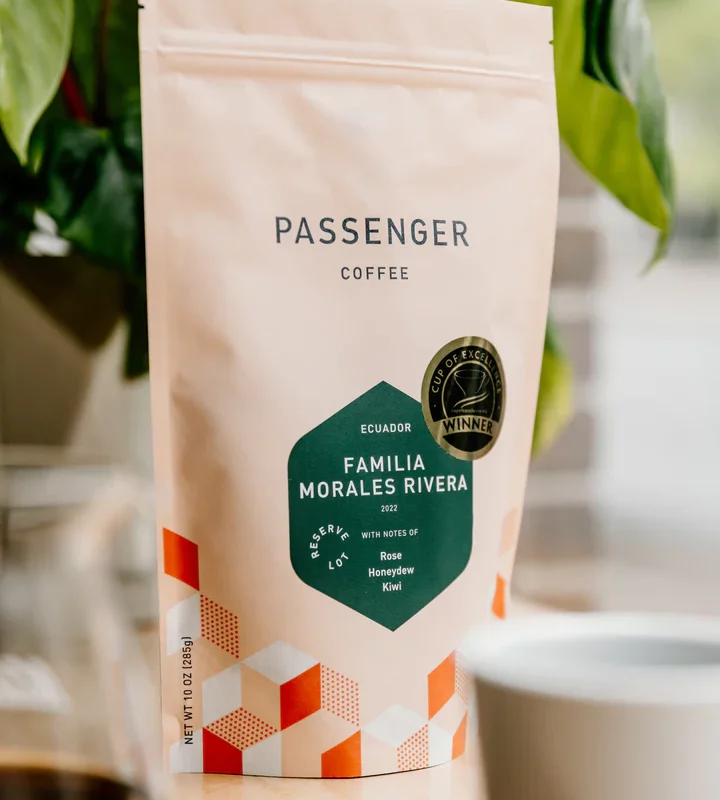
About this Coffee
itrus oil and a captivating bouquet of jasmine, rose, and bergamot florals on the nose introduce this stunningly elegant and nuanced Cup of Excellence winning coffee from the Morales Family in Pichincha, Ecuador. An exceptionally clean and juicy acidity of kiwi, and starfruit is followed by a delicate florality that carries throughout the finish, which continues to sweeten with flavors of melon, candied lemon, and apricot as it cools.
This Cup of Excellence winning coffee from the Morales Rivera family in Pichincha Ecuador, is among the finest coffees we’ve had the privilege to taste at Passenger. The hallmark varieties of Ecuador’s growing specialty coffee sector, Sidra and Mejorado, shine in this cup and provide a compelling example of how the Cup of Excellence continues to reframe and push the boundaries of the potential for quality and our perception of coffee’s value.
In recent years, the finest Ecuadorian coffees that we have had the opportunity to taste have tended to be separations of one of two Arabica varieties: Sidra and ‘Typica’ Mejorado. This particular selection is an immaculate example of a coffee containing both varieties, and is the first coffee we’ve bought from Familia Morales Rivera whose farm, Cruz Loma, is located in the mountains of the Pichincha canton of Ecuador’s western Manabí province. This coffee took third place in the 2022 Ecuador Cup of Excellence competition, and is among the finest coffees we’ve ever tasted here at Passenger.
Since its beginning in 1999, the Cup of Excellence has enjoyed international renown as the preeminent competition and auction for top quality specialty coffees. Following the first Cup of Excellence auction in Brazil, the competition has gradually expanded in scope to include fifteen countries of origin and counting. Each year, multiple COE competitions are held in participating countries, and while the setting changes, the goal is always the same: to identify and bring to market the finest coffees produced by that country of origin in a given harvest year.
Cup of Excellence competitions proceed via a rigorous process of blind analysis, first by a National Jury of roughly a dozen people (who, themselves, are rigorously vetted for the honor of being a Cup of Excellence judge), and then by an International Jury comprised of roughly 20 industry professionals from around the globe. As each lot enters the competition process, it is assigned a code known only to the competition auditor. Each lot is cupped (tasted) numerous times. The further along the competition a coffee progresses, the greater the number of times it has been blindly evaluated. A coffee that ultimately makes it to the “top 10” will have been tasted at least 120 times!
After being assigned a final ranking, the coffees are sold through an online auction which tends to drive prices quite high. Overall, this is a net positive for producers and the industry at large as it incentivizes farmers to carefully produce the best possible coffee to submit to the competition, thus treating the crop as a truly specialty item and further distancing and distinguishing specialty coffee from commodity coffee and commodity-driven approaches to producing and selling coffee. Further, it normalizes high prices for coffee – a necessity if coffee production is to continue into the foreseeable future. Finally, the Cup of Excellence plays an important role in facilitating market access for small coffee producers that might otherwise struggle to connect with specialty buyers who are motivated to pay excellent prices for their coffee. Many producers who enjoy success at the Cup of Excellence find buyers through the competition that they are able to build valuable ongoing partnerships with.
The outstanding floral cup profile of this coffee is almost certainly attributable, in part, to its varieties, which have come to be hallmarks of the finest Ecuadorian coffees grown in this region. While Typica Mejorado (usually translated as ‘Improved’ Typica) is the most commonly used name for the Mejorado variety, the name is somewhat misleading due to the fact that genetic testing has indicated that the variety is not a Typica at all. The variety was developed on an experimental plot owned by Nestlé and is actually a cross of a Bourbon-type variety and an Ethiopian landrace – providing some explanation for the elegant layers of florals, citrus, and ripe fruity notes that Mejorado lots often exhibit in the cup. While very little is yet known about the Sidra variety, what we do know suggests that its story is similar to that of Mejorado. Originally believed to be a cross between Bourbon and Typica, testing done by World Coffee Research has shown Sidra to also be genetically similar to Ethiopian landrace varieties.
We love Ecuadorian coffees. At their best, they offer a unique balance of delicate, browning sugar sweetness, floral qualities, and clean, fruit-driven acidity that is reminiscent of our favorite East African coffees. This coffee stands as a case in point, not only of what the best Ecuadorian coffees can offer, but also what we find so special in the very best coffees we get the privilege to taste, full stop. We could not be more excited to share this coffee and the outstanding work of the Morales Rivera family that it represents.